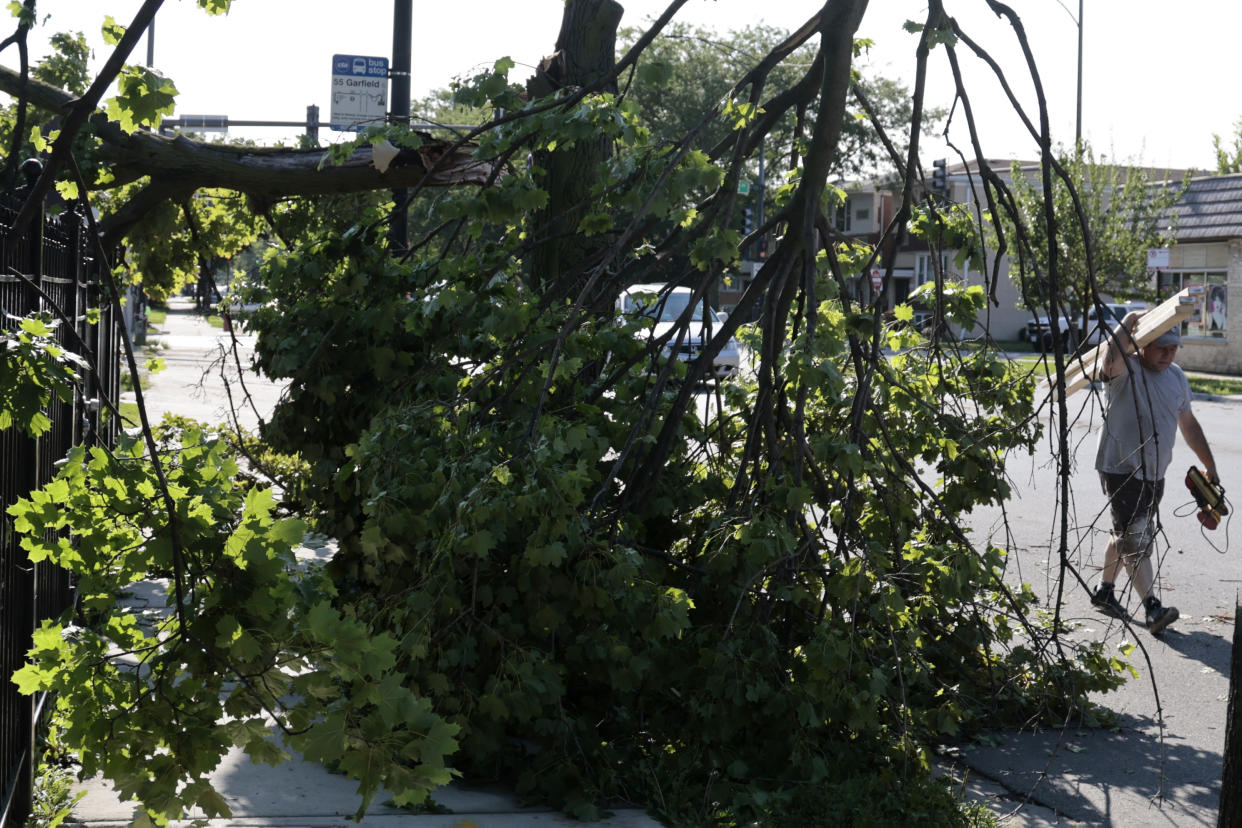Extreme heat and humidity expected in Chicago Monday after Sunday night storms

Extreme heat and humidity are expected in Chicago Monday after Sunday night storms rolled across the area, causing tree damage and power outages.
Weather officials said that temperatures in the city will soar into the 90s throughout the day, with a peak heat index of between 100 and 110 degrees. The heat index approximates how air temperatures feel to the human body when coupled with the day’s humidity.
A heat advisory was issued for counties in northern and central Illinois beginning at 8 a.m. Monday. Residents of Ogle, Lee, DeKalb, La Salle, Kendall, Grundy, Kankakee, Livingston, Iroquois, Ford, and Will counties are urged by authorities to take extra caution today.
A magnitude 3.4 earthquake in DeKalb County felt in Chicago area overnight
On days of extreme heat, residents should be sure to stay hydrated, remain indoors, wear loose and light cotton clothing, and minimize the use of ovens and stoves, according to Chicago’s Office of Emergency Management and Communications.
Dozens of air-conditioned spaces and cooling centers will be open across Chicago today for residents needing respite from the weather.
Later tonight, more strong to severe thunderstorms are expected to strike Chicago from approximately 7 to 9 p.m., according to the National Weather Service.
“Strong, destructive winds are the primary concern, although tornadoes, large hail, and flash flooding will all be possible,” wrote NWS Chicago on their X page.
More storms are possible Tuesday south of I-80, but conditions are overall expected to level out by midweek to “much more comfortable” temperatures, according to the NWS.
Amid the extreme weather across the Midwest, Sunday night marked the second of three consecutive nights of severe thunderstorms in northern Illinois.
A severe thunderstorm warning was issued in Chicago at just after 10 p.m., staying in effect until 11 p.m. as the storm struck the city with high-speed gusts of wind and bouts of thunder and lightning.
For those living in downtown Chicago, a tornado warning was also issued at 10:38 p.m., but was lifted just over ten minutes later.
The storm system traveled east across northern Illinois, coming after another set of severe thunderstorms the night before on Saturday. Flood warnings are still in effect this morning for rivers across the Midwest, according to the NWS.
Within Chicago, damage primarily stemmed from falling trees that landed on cars or power lines during last night’s strong winds, according to the Chicago Fire Department.
The Department of Streets and Sanitation Bureau of Forestry has received 586 emergency calls since Sunday regarding clean-up of storm debris, according to a spokesperson. Residents can contact 311 to report any fallen trees or other debris in their neighborhoods after extreme weather.
Fallout from the storm also disrupted travel plans and caused power outages across the area.
Electricity utility ComEd reported over 600 outages on Monday at 8 a.m., which left more than 16,000 customers in northern Illinois without power.
Meanwhile, over 1,200 flights arriving at or departing from Chicago O’Hare International Airport were delayed last night, while 92 were canceled. As of 9:30 a.m. on Monday morning, another 40 flights through O’Hare have been canceled.
The Metra commuter rail also experienced seven delays last night due to the storms, all of which took place on their Union Pacific lines, according to a spokesperson.
Though the CTA’s rail service was not impacted, a number of its buses have had to reroute due to fallen trees blocking roads, a spokesperson said.
“Several downed trees throughout the city caused minor reroutes to our bus service this morning, particularly express routes that travel along Inner Lake Shore Drive due to a downed tree at Stratford,” the spokesperson said in an email. “The city is in the process of removing the tree.”
During the storms Saturday night, most sailors competing in the 115th Chicago Yacht Club Race to Mackinac were in the direct path of the extreme weather. Three boats had their masts broken, while one man went overboard and had to be rescued by a fellow competitor, according to race chair Winn Soldani.
By Sunday evening, however, all competitors had traveled far enough north to be out of the path of the next round of thunderstorms, Soldani said.
This year has been one of the fastest races in the history of the competition, he added, thanks to the unusually strong winds.

